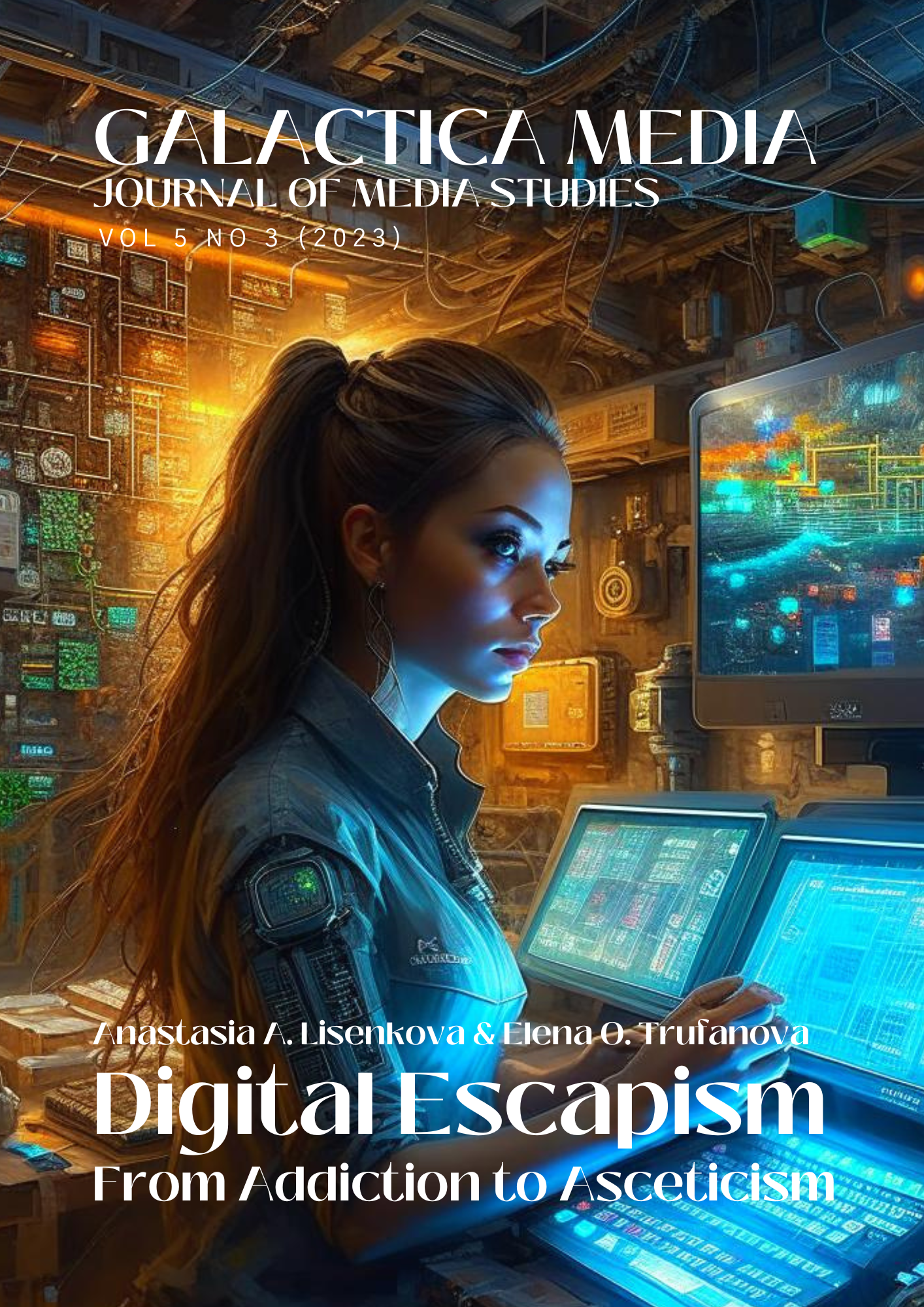Abstract
The rapid development of digital virtual reality has exposed social problems associated with the transformation of forms of cultural experience transmission, adaptation, socialization, and communication. Information saturation and stress caused by the acceleration of the life rhythm, constant changes on the one hand, and an attractive, constructed hypervisualized digital world on the other, have created conditions for the emergence and development of new forms of escapism and digital avoidance. The purpose of the study is to assess the degree of influence, opportunities, and risks associated with the problems of human interaction and the new virtual reality, ways to escape from the “routine of everyday life” into a new digital environment. Within the framework of the study, the forms of digital escapism were identified as ranging from radical, replacing reality, to conscious and balanced forms within the framework of digital asceticism based on the principles of eco–friendly network consumption and digital ethics. As a result, it was concluded that the growth of escapist tendencies indicates the imbalance of digital and physical realities and needs a harmonious hybrid inclusion in the daily life of society of digital consumption norms based on the principles of de-anonymization and social responsibility, as well as the rules of digital hygiene.
References
Arshinov, V. I., Grimov, O. A., & Chekletsov, V. V. (2021). Cyberanimism: The Art of Being Alive in the Hybrid Society. Philosophical Problems of IT & Cyberspace (PhilIT&C), 2(20), 39–59. https://doi.org/10.17726/philIT.2021.2.3 (In Russian).
Baeva, L. V. (2018). Escapism in the Digital Society from Hikikomori to ‘Death Groups’. Values and Meanings, 2(54), 53–68. (In Russian).
Boldakova, I. A. (2015). Key Risks of Cyber-socialization among Youth. Concept: Scientific and Methodological e-Magazine, 37, 151–155. (In Russian).
Calleja, G. (2010). Digital Games and Escapism. Games and Culture, 5, 335–353. https://doi.org/10.1177/1555412009360412
Campbell, D. (1997). The Hero with a Thousand Faces. Vakler; Refl-book; AST. (In Russian).
Castronova, E. (2005). Synthetic worlds: The business and culture of online games. University of Chicago Press. https://doi.org/10.7208/chicago/9780226096315.001.0001
Castronova, E. (2008). Exodus to the Virtual World: How Online Fun Is Changing Reality. St. Martin’s Griffin.
Demakhina, T. V. (2021, December 23). 45% of People Would Rather Give Up Sex Than Their Phone. Laba. https://l-a-b-a.com/blog/2914-45-lyudey-skoree-otkazhutsya-ot-seksa-chem-ot-telefona (In Russian).
Evans, A. (2003). This virtual life: Escapism and simulation in our media world. Fusion Press.
Kane, A. (2021, July 29). 10 key predictions from our latest trend report ‘2031: A Future World’. DAZED. https://www.dazeddigital.com/science-tech/article/53653/1/dazed-studio-trend-report-2031-a-future-world
Lisenkova, A. A. (2021). Transformation of Socio-cultural Identity in the Digital Space. PGIK. (In Russian).
Lisenkova, A. A. (2022). Digital Identity: Freedom of Fragmentation and Discreteness or Dangerous Integrity. Akademizdat. https://doi.org/10.24412/cl-36976-2022-1-319-327 (In Russian).
Lysak, I. V. (2017). Computer and Internet Dependency: Evolution of Approaches to Problem Research. World of Science, Culture, Education, 4(65), 206–209. (In Russian).
Petrova, E. V. (2022). Ecology of the Digital Environment as an Attempt to Respond to the Civilizational Challenges of the Digital Age. Voprosy Filosofii, 11, 99–109. https://doi.org/10.21146/0042-8744-2022-11-99-109 (In Russian).
Pleshakov, V. A. (2016). Editor’s Word: On Cyber-socialization of Humans and Its Organization on the Internet Portal ‘Homo Cyberus’. Homo Cyberus: Electronic Scientific-Popular Journal, 1. http://journal.homocyberus.ru/Pleshakov_VA_1_2016 (In Russian).
Poster, M. (1995). The Second Media Age. Polity Press.
Prensky, M. (2011). Digital wisdom and homo sapiens digital. In Deconstructing Digital Natives. Young People, Technology, and the New Literacies (pp. 15–29). Routledge.
Sacasas, L. M. (2019, February 25). Digital Asceticism and Pascalian Angst. The Frailest Thing. https://thefrailestthing.com/2019/02/25/digital-asceticism-and-pascalian-angst/
Shapinskaya, E. N. (2013). Escapism in Cyberspace: Unlimited Opportunities and New Dangers. Cultural Journal, 2(12), 2. (In Russian).
Stenseng, F., Rise, J., & Kraft, P. (2012). Activity engagement as escape from self: The role of self-suppression and self-expansion. Leisure Sciences, 34(1), 19–38. https://doi.org/10.1080/01490400.2012.633849
Subudhi, R. N., Das, S. C., & Sahu, S. (2020). Digital Escapism. Journal of Humanities and Social Sciences Research, 2(S), 37–44. https://doi.org/10.37534/bp.jhssr.2020.v2.nS.id1071.p37
Trufanova, E. (2021). Digital Escape Or Escape From The Digital. In Man, Society, Communication. European Proceedings of Social and Behavioural Sciences (Vol. 108, pp. 822–828). European Publisher. https://doi.org/10.15405/epsbs.2021.05.02.105
Trufanova, E. O. (2019). Information oversaturation: Key problems. Philosophical Problems of IT & Cyberspace (PhilIT&C), 1(16), 4–21. https://doi.org/10.17726/philIT.2019.1.16.1 (In Russian).
Trufanova, E. O. (2021). Escapism: Between Nature and Culture. Vestnik of Northern (Arctic) Federal University. Series ‘Humanitarian and Social Sciences’, 1, 125–134. https://doi.org/10.37482/2287-1505-V081 (In Russian).
Tuan, Y. (1998). Escapism. Johns Hopkins University Press. https://doi.org/10.56021/9780801859267
Warren, J. (2020, June 19). Escapism: Please Don’t Make Me Think About It. The Current. https://thecurrentmsu.com/2020/06/19/escapism-please-dont-make-me-think-about-it/
Zhuravlev, A. L., & Nestik, T. A. (2016). Psychological Factors of Negative Attitude to New Technologies. Psychological Journal, 6(37), 5–14. (In Russian).

This work is licensed under a Creative Commons Attribution 4.0 International License.


